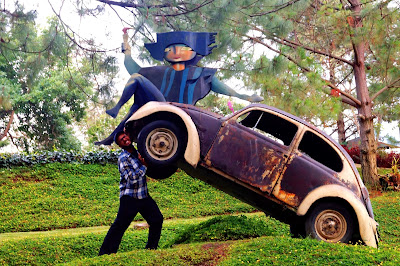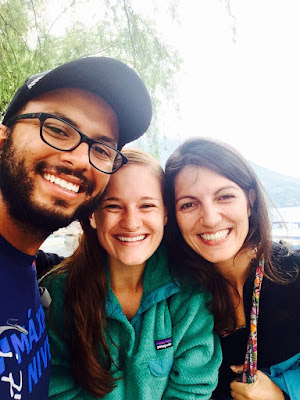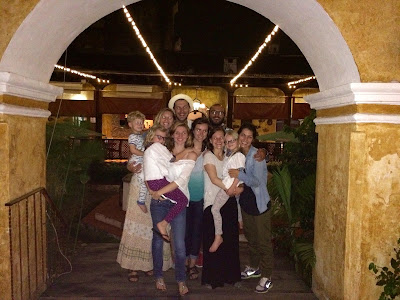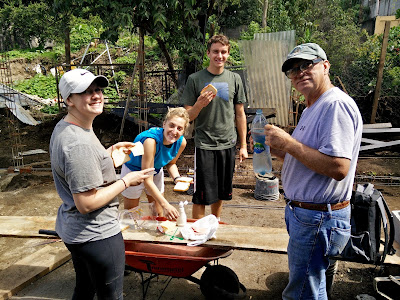I wake up at 06:20,
early enough to skip the bathroom line and smell the coffee boiling
in the kitchen. Quickly I dress my new rough denim jeans and
synthetic t-shirt that I got by participating on the beneficial run
on a Sunday. They are still dirty and smelly from the work days
before. I leave my boots for last to avoid
messing up Thelma's ceramic floor. She's our host mom, our
“Guatemama”, and it's busy in the kitchen, like usual, preparing
breakfast. It has everything I love for eating in the morning: fresh
tropical fruits, granola, fruit yogurt, filtered black coffee and
some omelet. Thelma's short and large lady, she's always caring for
her big family and it's usually smiling. She's the matriarch,
everybody loves and respects her, including me.
 |
| Beautiful old colonials houses everywhere |
 |
| My last day of work |
 |
| Me and the guys from Niños Con Bendicion |
When I'm done eating
my breakfast Diana and the other roommates start coming and sitting
on the table. I saw a few people coming and going, from all kind of
backgrounds. There were two girls fresh into University. A family of
six – yes, six. Mom, dad, two daughters, a youngest boy and even a
friend-nanny, I'll tell more about them soon. The only girl not from
the US, from Amsterdam, and briefly her dutch friend. A medical
researcher guy. A student of some kind of medical subject that I
never quite understood. From Hawaii, a couple and their young boy. A
blond women with stylish haircut and glasses looking like an artist
with some amazing life stories. A group of five young girls still at
high school. Some of them met each other in the house, others left
before having the change. I had the privilege of living with all of them
for some time. We all came to Antigua to improve our Spanish and
fulfill the need for travel. For some it was the first time on an
airplane and other had already traveled around the world.
At 07:10 boots laced
and gear in my back I leave the house headed to Maximo Nível office
in the heart of the historical city, an UNESCO Heritage site. Maximo Nível is a for profit
organization that we hired to help facilitate our volunteering work
and Spanish classes. They did a great job for a reasonable price so
it's definitely recommended. The people that work in Antigua's office
were truly caring and did their best to help with whatever we needed.
It takes
approximately 12 minute fast paced walk from my house to the office.
I avoid a bunch of noisy and smoky chicken-buses and many other
people on the streets. Local students in uniforms headed to school,
foreign students to their Spanish classes, other volunteer workers to
their projects. I say “Buenos dias!” to a few familiar faces. I
can take a different route every day and I do it so that I can enjoy
the views of the many cool cafes, hostels, handcraft shops, grocery
stores and so on. Mostly all unique, almost no global chain shop
around. Just before getting into the office I take a quick look
behind my back to check the volcanoes on the horizon. No fire today,
unfortunately. On good days I hear thunder on a cloudless sky and see
some smoke above the volcano. It's active and roaring.
At 07:25 I meet my
fellow workmates and usually there's someone new. I had the privilege
and the pleasure to work with a bunch of different people. There was
a recently graduated tall guy from Iowa that speaks on a very lazy
pace, our best worker is a blond girl from New Jersey, a
vietnamese-danish girl that wore only black, a short and funny
Italian girl living in Oregon, a young diabetic girl from Toronto, an
ex-hairdresser from Chicago on his 50s, a retired sir reaching 80.
The last new one I met was a med-school girl from Canada. My boss,
Freddy Antonio or Tony how I call him, shows up and cracks some salsa
moves and says “Vamos muchachos!” and off we go. Tony's amazing
person! He's always cheered up and makes sure everyone around is
smiling. Joking and teasing all the time but also teaching and
advising. He really cares that we're having a good time and being
productive. Since I was the only one speaking reasonable Spanish, we
got close quite quickly, translating instructions from Spanish to
English – even tough he speaks it – and telling stories to each
other. I learned from him the tricks of mixing concrete, the latest
corruption scandals, how Guatemalans see the world and tips for a
happy marriage.
We head to San
Felipe de Jesus, a little town to the north of Antigua. Two dogs
usually walk with us, somehow they like us even tough we never gave
them anything. There's a local market in front of the church's
square. Besides a closed middle-class condo and a five star country
hotel, there's not much, only ordinary people getting by. Next to the
local primary school is an elderly home, Casa Maria, where we're
building a new kitchen for them. The place used to be a private for
profit business but due to the financial difficulties of its guests,
the business changed to a charity organization. They housed around 60
grandpas and grandmas of which 20 paid a monthly fee for some better
conditions and the workers salary. The other 40 or so where there
completely free and the organization survives – barely – thanks
to donations and other charity work.
There were all sorts
of elderly people there, some perfect lucid and talkative, others
schizophrenic, with advanced Alzheimers and other mental diseases, in
wheel chairs or tied to poles, all frail. Most had a name and a
family, others were just left there and they had no idea who they
were, where they came from. The facilities where barely acceptable.
It was very humbling place and it definitely needed all the help it
could get. I was extremely happy to be able to help them anyway I
could, but truthfully, I couldn't handle working directly with the
elderly in those conditions.
One day, there's was something unusual
in the entrance, bellow the shrine to Holy Mary: a white bed sheet
covering a small solemn mount. It was Dona Maria, “Choula” as we
called her because she would scream it almost every day, the whole
morning and annoy us and anyone around her. It was sad and disturbing
thought to always be calling for someone that will never come and
never be able to realize it. This was a sad event for us, so sudden.
We started working even harder to make sure the kitchen was ready as
soon as possible. We start getting busy at 08:00.
 |
| Learning how to whisper |
 |
| I got really strong working with construction! |
 |
| Hiking Pacaya Volcano on the rain. Can you see the vapor? |
 |
| Night out in Antigua with our Spanish teacher Eric and dutch Tess |
Oh yeah,
construction is hard work. It takes time, there are many details to
pay attention and you can get hurt badly if you are not careful –
thankfully we only got a few scratches. Nothing was too complicated
and working with your body is very gratifying. It's instant feedback
for your efforts. We would dig big holes with shovels, bend and cut
rebar to make steel columns, mix sand with rocks and cement to make
concrete. We carried building materials, like cinder blocks and
rebar, to the construction zone. With levels, plomos and a fishing
lines we would slowly raise the walls and concrete columns. Some days
the supervisor would show up and help us out. At 09:30 we would have
a break, eat some snacks, tell stories and jokes to each other and
then we would continue until 11:30. It was a very relaxed working
environment very different from the real thing as Tony would tell me.
 |
| Running to our goals |
 |
| Beautiful ruins everywhere |
 |
| The cliché |
 |
| I almost fell into the water... |
 |
| Our friend Cambray at San Pedro, Lake Atitlan |
We all walked back
to Maximo's office, some would take shortcuts to their houses. I would
walk back home through the most shadowy path to avoid the heat. If I
needed some apples, medicines or if there was anything interesting
happening around I would take a detour. Surely I didn't want to miss
lunch because it was always wonderful. Thelma would always impress us
with a dish even better than the previous. We were very lucky because I heard that local food, for the locals, is usually not so good. So, around 12:00
I was back at the house and would run straight to the shower but there still one hour to relax until lunch was served. Diana would
arrive usually a few minutes after me so we could chill in our room
and tell the day's stories.
Lunch time was
always family time for me in Brasil and at Thelma's, I felt the same
vibe. All the chatter, passing plates around, people telling good and
bad stories was there. It was so nice! One of my favorite stories is
of the Doese Family – it's pronounced like “daisy”. They are a
young family of five from US. Mom and Dad met in college, got married
and started having kids. The whole family is very religious –
Catholics maybe? – they sing and play at their church, they were
involved with volunteering other times and baptized all their
children. Oh, the children! So sweet, innocent, clever, fragile,
pure, loving. Actually, it's been a long time since I saw so many
demonstrations of true love. The love that a stressed mom after a
long day that took too long to end pour at her baby boy when he hugs
her when she's finally back. The love that dad shows to his older
daughter that just won't behave at the dinner table and has to be
corrected - going to bed earlier. I've never once saw the parents being violent with their
kids. My mom would slap me for much less than what I saw the kids
doing. The parents would talk and explain things. They would make
propositions and kids would take compromises. They explained why they
were being punished all the time specially when the kids made a bad
decision. Cheating and lying were the worst crimes. It was very
tiring but also amazing thing to see. It tickled my fatherhood
instincts.
 |
| The Doese's, Tess and we at Monterrico Beach |
 |
| Last goodbye to our friends |
The Doese's are a
great family and in many ways they are perfectly normal but what sets
them apart is what they are doing now and why: they quit everything
and moved to Puebla, México, to help out in an orphanage as missionaries. I make
this sounds so boring and silly but I can't help it, my words are not
capable enough to fully communicate someone's calling. For that what
it was. Something that makes you put your family under a lot of
stress and risk must be something God send, must be a total commitment to faith
and purpose. It was awe inspiring. They made us feel sane and normal
again, specially in a world full of selfish people and its actions,
yours truly included. The cherry of the cake was their "nanny":Lis. She was always quiet because she was "working" but we talked and I was so impressed with her. An entrepreneur - she helped co-found a brilliant company called Trades of Hope - a writer, a student, a learner, a bright young girl. These six were great company and I wish them all the best, with all my heart.
Around 13:40 all the
guests are done with lunch and Thelma's family would come and eat.
They had their own meal but would also eat whatever we hadn't
finished. Seldom we would sit and chit-chat with them for a few
minutes before coming back to our room where I would take a heavenly
ciesta for half hour. From 14:30 to 15:30 it was free time. Usually I
would just be wasting time on social networks, watching videos or
reading articles. Some times we would do Spanish homework or plan the
next moves of our trip.
At 16:00 our Spanish
class started, at Maximo's Nivel school also in the city center. It's
a red building with 5 classrooms, an open terrace for studying and
social events and a computer room for Facebooking – you could do
more of course but what do youngster like more than socializing? In
the first two weeks we had a cool young men as a teacher. As Diana
likes to put it, he is a character. He grew up in Antigua, attended
to Arts school – dancing, drawing, theater -, he has a technical
degree in electronics and computers, he founded a charity school for
teaching informatics to kids, he taught Spanish for foreigners for
many years, he is a professional DJ and audio engineer and now he's
graduating in Law School. After that he wants to continue his dream
of coaching football to young kids. The guy was basically everything
and he was a good teacher and even took us out one night in his
convertible old Mustang to some really cool bars in town. The last
two weeks we had a different teacher, this time a local lady and
housewife. She was an incredible Spanish teacher and as kind as a
grandma. We learned a lot with them in just one month and hopefully
we'll stop speaking Portuñol – mix of Portuguese and Spanish –
soon.
 |
| My favorite day of the week: beerness |
 |
| I shrunk!!! |
 |
| Lucky shot from a horse that was passing by |
 |
| I never learned why masks are so popular in Guate... |
After school, which
ended at 18:00, we had one hour until dinner so we usually just went
straight back home. Rarely we would meet a friend for ice-cream or
coffee after class. So at 19:00 the same routine of lunch was
repeated but with simpler dishes. Everyone would retire to their
bedrooms around 20:00, Di and I would spend more time online and by
22:00 would be calling it a day. We lived in the far southeast corner
of the city, outside of the historic center, and had a tight schedule
for meals, volunteering and school. We almost didn't go out at night
at all but I heard from my co-workers that Antigua's a fun place to
party and the gringos go crazy. But my first teacher and my boss told
me it's even better for local guys because there are tons of blond
foreign girls around wanting to experience a different culture! On
the weekends we would explore Antigua and its wonderful ruins, cafes
and shops. We went to Monterrico beach, to the Pacaya volcano and to
Lake Atitlan. We were also sick for a weekend so we just stayed in
bed (and close to the toilet).
 |
| Happy hard workers. You should also try some volunteering |
 |
| Boloney day = happy day |
 |
| Noisy, pollutant, old and stylish: chicken buses! |
 |
| The builders also know how to have fun - Amazing photobomb! |
 |
| I'll miss you Tony. Cheers! |
 |
| Our last day working. So many emotions. |
The Hawaiian lady
introduced us to the concept of Mini Life, which is exactly what we
had in Antigua, that she and her husband have been doing for a few
years now. Instead of locking up their house and doing tourism for
ten days, like many other people would, they rented their house via AirBnb for a month and moved to an interesting city to work and live there. We loved the idea and
for sure we'll try it more.
Living for a month
in Antigua was a marvelous experience. Since the beginning we saw it
as one of the most important period of our travels and we're glad to
say that we made it. We got what we wanted! We said many goodbyes to
our new friends, we shared contacts and tears of happiness and
sadness with them. But now the journey goes on, heading north to
unplanned countries: Mexico and Cuba!
Have you been to Guatemala too? If not, what are you waiting for? Tell us more on the comments!
Cheers!
















































